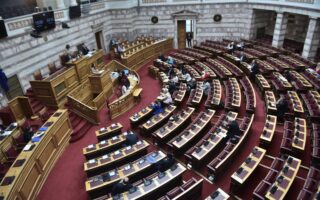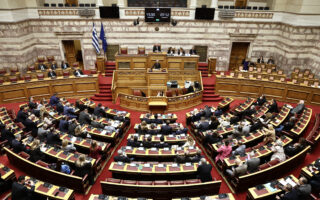The spirit of public service

“A smile and a wave work the same in every neighborhood. If you want to renew your faith in humanity and you want to renew your faith in the country, walk across it and put yourself dependent on the kindness of strangers.”
Lazarus Lake
I direct a collegiate civic engagement hub in Thessaloniki. Last month some compatriots and I mobilized a team of volunteers and organized a nonpartisan voter registration drive for the benefit of citizens of the United States currently residing throughout northern Greece. It was a collaborative pursuit, the goal of which was to provide both an opportunity and a service to others. Without recompense, let alone profit.
 My center has conducted campaigns like this on and off for the past 25 years. We have made the defense of democracy one of the cornerstones of our institutional identity. The effort has added significance these days given the large number of young Americans attending American post-secondary institutions in Greece and, indeed, around the world; it matters, furthermore, because the fate of democratic governance may hang in the balance this year, when untold millions of people across the globe will be eligible to vote in an election. Meanwhile, we have also overseen or facilitated scores of projects conceived to address the needs of various local communities – from refurbishing a school for Roma children, to volunteering at soup kitchens, to animating crowdfunding events for social entrepreneurs, to hosting master classes, workshops, and moot court practice sessions for local high school and university students. We call all these activities public service initiatives.
My center has conducted campaigns like this on and off for the past 25 years. We have made the defense of democracy one of the cornerstones of our institutional identity. The effort has added significance these days given the large number of young Americans attending American post-secondary institutions in Greece and, indeed, around the world; it matters, furthermore, because the fate of democratic governance may hang in the balance this year, when untold millions of people across the globe will be eligible to vote in an election. Meanwhile, we have also overseen or facilitated scores of projects conceived to address the needs of various local communities – from refurbishing a school for Roma children, to volunteering at soup kitchens, to animating crowdfunding events for social entrepreneurs, to hosting master classes, workshops, and moot court practice sessions for local high school and university students. We call all these activities public service initiatives.
Interlocutors occasionally wish to know why we do what we do. Even more frequently, I am asked by Greek acquaintances what we mean by this phrase “public service,” which seems to the uninitiated to imply a task performed by a salaried employee in the public sector. In point of fact, the doctrinal and institutional origins of gestures rendered by private citizens to others for the benefit of one’s community predate by more than 2,000 years the establishment of a professional civil service. One finds allusions in classical texts to some form or another of “public service,” for instance in dramatic representations of philanthropia and in debates over who was fit to hold public office in the polis. An articulate dedication to serve was later at the core of Stoicism, particularly in its late Hellenistic and Roman iterations, which acted as a bridge between the thought and values of antiquity and those of more modern times. As the Roman author Seneca wrote, “We shall remain in active service right up to the very end of life, without ceasing to apply ourselves to the common good, to help the individual, and to give assistance with an aged hand even to our enemies.” Of course, there are many instances of beneficence and charitable giving in early Christianity which point in a similar direction.
An appreciation of service has long been embedded in American popular culture. Bearing in mind that the Latin servus was used to designate a slave or a servant, Americans have characteristically regarded the voluntary act of serving – one’s God, one’s country, one’s fellow citizens, even one’s neighbors – to be the highest sort of interpersonal activity one can undertake. This ideal came to North America along multiple parallel paths – Puritan and evangelical piety and Jesuit pedagogy; classical republicanism and certain strands of social contract theory and Utilitarianism; a modern approach to fulfilling a military obligation; the rise of the public utility corporation and of concurrent philanthropic practices, both dedicated to the “general welfare”; a rationale for colonial empire. Whatever its source, the message has found fertile ground in the United States, where an ethos of service is indeed deeply rooted, where, as the scholar Lynn Stout once observed, “Unselfish prosocial behavior is so omnipresent… that it often goes unnoticed.”
I have witnessed first-hand a proliferation of civil society organizations and citizen initiatives throughout Greece over the past few decades, and have the unmistakable impression that a characteristically Hellenic ethos of service animates these undertakings
The French author Alexis de Tocqueville understood this already in the mid-19th century. Tocqueville admired the Americans he met on his travels for what we would call their attachment to community service and their capacity to associate voluntarily in collective endeavors. “The health of a democratic society may be measured by the quality of functions performed by private citizens,” he concluded. A century after Tocqueville penned “Of Democracy in America,” this moral standard of service would inspire the Greatest Generation to overcome the Great Depression and defeat the Axis Powers. It continues to be compelling for many immigrants who discover a special sense of American-ness through a calling to public service, both as vocation and as profession, despite resistance in certain corners to the growth of the public sector brought about by the New Deal.
Roman Emperor Marcus Aurelius wrote in his Meditations, “Whenever you have trouble getting up in the morning, remind yourself that you’ve been made by nature for the purpose of working with others.” Nearly two millennia later Michael Dukakis, the Greek-American governor of Massachusetts who ran in 1988 for president of the United States, rallied his young supporters, “There is nothing you can do in this world more fulfilling and more satisfying than giving of yourself to others, and making a contribution to your community and your state or your nation and your fellow citizens…” Such dedication still resonates among a wide swath of Americans in the early 21st century, and arguably underpins a younger generation’s penchant for activism, albeit more fleetingly – alas! – as the ideals of service and participation and engagement are in jeopardy of becoming a cottage industry commandeered by venal self-help self-helpers. Who among us has not felt of late as if they were bowling alone? Who has not cringed when an aloof congressperson soullessly offers thanks to a member of the military or a senior public official for their service? One can almost imagine Donald Trump thinking that service is for suckers.
If the golden age of public service in the United States risks becoming a thing of the past, there are signs that we may be witnessing the advent of a new golden age right here in this country, where, fittingly, the notion advanced herein was first articulated, despite the specter of recurring anarchic violence and a perennial, if not systemic, lack of confidence in public authorities. Wherever I have traveled in Greece I have been the beneficiary of the extraordinary kindness and hospitality which have distinguished Hellenes since the time of Homer. I have witnessed first-hand a proliferation of civil society organizations and citizen initiatives throughout Greece over the past few decades, and have the unmistakable impression that a characteristically Hellenic ethos of service animates these undertakings. Moreover, I am also aware of pockets of innovation and entrepreneurial endeavor throughout the Greek public sector, although the most committed among those intent on reforming the system from within are at times constrained to do their best work beyond Greece’s borders. Their resourcefulness may not yet be the norm, but it is worth celebrating nonetheless.
Unwittingly, perhaps, a spokesperson of sorts for this trend may have emerged in the figure of the historian Maria Efthymiou, who has given a series of scintillating public talks on the subject of Hellenism ancient and modern. A few months ago, in a lecture delivered to an overflowing crowd in downtown Thessaloniki, she changed tack and riffed the theme of the individual and society over the course of world history – what she called “monaxia kai koinotita” – in a contemporary Hellenic variation of the origin of the social contract. Among other things, she revealed in what contexts someone might be inclined to contribute to the welfare of larger groups. One segment of her presentation traced the discrete historical developments that gave rise to that sense of personal responsibility which is at the heart of what we are calling “public service.” (Was the intent to wean contemporary Hellenes away from their chronic dependence on the apparatus of the welfare state?)
So it is that the big story at the center I have directed since 1999 is not our longevity or our adherence to an American model of serving one another. It is rather that among the most significant events we have organized are those in which we showcase inspiring new approaches to public service programming, where we share the many lessons we continue to learn from our local peers. As Governor Dukakis might have put it, is there any greater expression of philanthropia than listening carefully to one another?
David Wisner is professor of international relations at The American College of Thessaloniki (ACT), where he is also executive director of the Michael and Kitty Dukakis Center for Public and Humanitarian Service, which is celebrating its silver jubilee in 2024. The views expressed here are his, and not necessarily those of ACT or Anatolia College.





